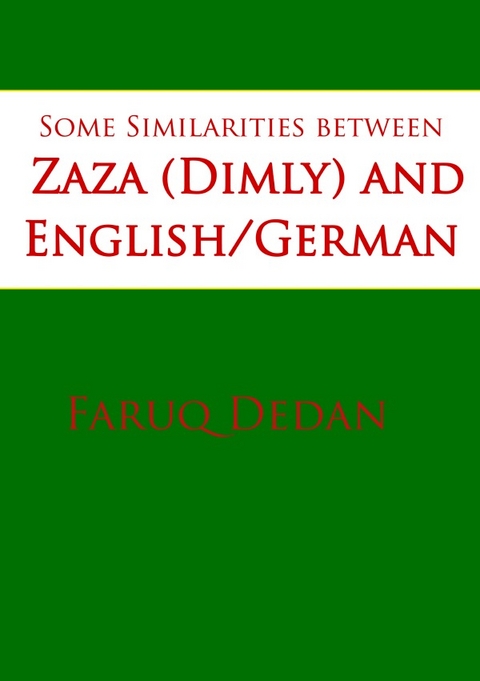
Some Similarities between Zaza (Dimly) and English/German
Seiten
2023
|
2. Auflage
epubli (Verlag)
978-3-7584-0496-2 (ISBN)
epubli (Verlag)
978-3-7584-0496-2 (ISBN)
The purpose of this book is to show some similarities between English/German and Dimly (Zaza language). Kurdish languages are derived from ancient languages and the roots of human civilisation.
The purpose of this book is to show some similarities between English/German and Dimly (Zaza language). Dimly is classified as one of the Northwestern Iranian languages, like the ancient Iranian languages Parthian, the language of the Medes, and the modern Kurmanji, Sorani, Balochi, etc.
Zaza is an Iranian language, a branch of the Indo-European language family. In the north, between the Euphrates and the Tigris, more than two million people speak it. There may have been dozens of pre-Islamic dialects and varieties of Iranian languages. It seems that most of these dialects and varieties have been lost with the movement of history in this geography.
The name of the western Iranians is known as Kurdish. Kurdish languages are similar to each other, but they do not understand each other. Recognised Kurdish languages: Kurmanji (20 million), Sorani (5 million), Zazaki (1.5 million), Hawrami (500 thousand), Kelhuri and Feyli (3 million), Şeyhbezeni,...
Since the Zazas lived in the mountains, their language has been well preserved. Due to the development of modern technology, movement in the
world has become easier. People can quickly change places and learn new things in the world. After the globalisation of people, small ethnic elements could not protect their own language and customs. According to UNESCO, the language and identity of the Zazas are likely to disappear in the future.
Kurdish languages are derived from ancient languages and the roots of human civilisation. Many words in European, Arabic and Turkish languages come from Kurdish languages. Civilization and writing originated in Mesopotamia, so many languages and civilizations have similar roots to the Kurds. That's why we don't want our language to be lost. Our ancestors were able to preserve this language for thousands of years and bring it to this time; we must not lose respect for our own roots and ancestry.
The purpose of this book is to show some similarities between English/German and Dimly (Zaza language). Dimly is classified as one of the Northwestern Iranian languages, like the ancient Iranian languages Parthian, the language of the Medes, and the modern Kurmanji, Sorani, Balochi, etc.
Zaza is an Iranian language, a branch of the Indo-European language family. In the north, between the Euphrates and the Tigris, more than two million people speak it. There may have been dozens of pre-Islamic dialects and varieties of Iranian languages. It seems that most of these dialects and varieties have been lost with the movement of history in this geography.
The name of the western Iranians is known as Kurdish. Kurdish languages are similar to each other, but they do not understand each other. Recognised Kurdish languages: Kurmanji (20 million), Sorani (5 million), Zazaki (1.5 million), Hawrami (500 thousand), Kelhuri and Feyli (3 million), Şeyhbezeni,...
Since the Zazas lived in the mountains, their language has been well preserved. Due to the development of modern technology, movement in the
world has become easier. People can quickly change places and learn new things in the world. After the globalisation of people, small ethnic elements could not protect their own language and customs. According to UNESCO, the language and identity of the Zazas are likely to disappear in the future.
Kurdish languages are derived from ancient languages and the roots of human civilisation. Many words in European, Arabic and Turkish languages come from Kurdish languages. Civilization and writing originated in Mesopotamia, so many languages and civilizations have similar roots to the Kurds. That's why we don't want our language to be lost. Our ancestors were able to preserve this language for thousands of years and bring it to this time; we must not lose respect for our own roots and ancestry.
Faruq Dedan was born in Hesran, Çermik, Diyarbakir, Turkey. His wish is to know the value of his mother tongue. He works on the roots of words and compares the similar languages. Faruq Dedan Hesrandi zao. Washtena ci erciyayena mayziwanie ci bi zaneyo. Rycheyanie vateyan ser girweyeno u merdimziwanan ano pie ver.
| Erscheinungsdatum | 19.09.2023 |
|---|---|
| Sprache | englisch |
| Maße | 148 x 210 mm |
| Gewicht | 51 g |
| Themenwelt | Schulbuch / Wörterbuch ► Unterrichtsvorbereitung |
| Geisteswissenschaften ► Sprach- / Literaturwissenschaft ► Sprachwissenschaft | |
| Schlagworte | dimli • Indoeuropean • Iranian • Kurd • kurdish • Kurdistan • Zaza |
| ISBN-10 | 3-7584-0496-7 / 3758404967 |
| ISBN-13 | 978-3-7584-0496-2 / 9783758404962 |
| Zustand | Neuware |
| Haben Sie eine Frage zum Produkt? |
Mehr entdecken
aus dem Bereich
aus dem Bereich
Buch | Softcover (2022)
Springer Vieweg (Verlag)
39,99 €
und wie man sie vermeidet
Buch | Softcover (2022)
C.H.Beck (Verlag)
14,00 €


